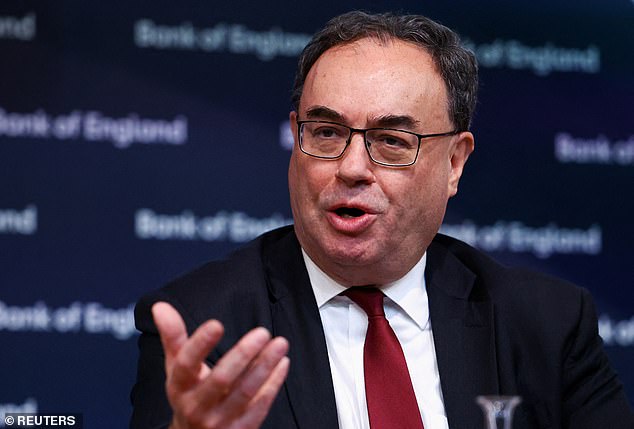Ben Bernanke’s report on Bank of England forecasting and the operations of the interest rate-setting Monetary Policy Committee (MPC), due in early 2024, will come none too soon.
The former Federal Reserve chairman, who guided the US so calmly through the Great Financial Crisis, should have no difficulty spotting the problems.
Anyone reading the tea leaves of the Bank’s pre-Christmas session, at which the base rate was held at 5.25 per cent, should recognise the lacuna.
In 2021, Governor Andrew Bailey and the Bank largely chose to ignore the key task of holding inflation at or around 2 per cent.
Instead, on a monthly basis, Bailey would write to the Chancellor, then Rishi Sunak, arguing that surging prices were transitory, a consequence of Covid supply issues, and would pass.

Asleep at the wheel: In 2021 governor Andrew Bailey (pictured) and the Bank largely chose to ignore the key task of holding inflation at or around 2%
To be fair, his views were not challenged by the Treasury until the inflation genie had long escaped the bottle.
The Bank now over-corrects.
Its minutes endlessly remind the nation that the remit of the MPC is to make sure ‘the inflation target applies at all times’.
The declared aim is to return consumer prices to 2 per cent in the medium term. The seriousness of the Bank’s declaration gives the interest setters little choice, whatever the economic and financial circumstances, but to keep their foot on the monetary brakes.
The aphorism ‘When the facts change, I change’ (attributed to John Maynard Keynes) appears to have little uphold at the MPC. Circumstances are altering rapidly
CPI inflation, now 4.6 per cent, is sharply down, albeit more than twice the target. Input prices driving the cost of living are tumbling.
Electricity tariffs, which affect all sectors of the economy from home heating to electric arc furnaces and the local pub, fell by 21 per cent in the last week and are 74 per cent down on the same week of 2022. Food charges are also falling.
The dataset also shows that the vast majority of trading businesses no longer feel the need to keep on increasing prices.
Recent interventions by the Competition and Markers Authority over fuel costs on forecourts and the excess profit margins of the fast-moving consumer goods companies, such as Kraft Heinz, Nestle and Unilever, should restrain greedflation.
Money market developments are not being given sufficient weight. History shows the Bank often tracks the behaviour of America’s Federal Reserve.
The US, and for that matter the European Central Bank, have so far done better than the Old Lady in suppressing prices.
Nevertheless, Bailey and the MPC can hardly ignore the doveish comments this week from Fed chairman Jay Powell, who is signalling early interest rate cuts in spite of America’s superior economic growth, ultra-loose fiscal policy and a tightening labour market.
Opinion on the markets is racing ahead of the Bank, with analysts forecasting multiple cuts in UK rates. Better mortgage deals already have been triggered and there is scope for much more in 2024.
MPC members are looking backwards. Kroll chief economist Megan Greene, former Citi economist Catherine Mann and Jonathan Haskel of Imperial College London are all still voting for higher rates.
At least Bailey has managed to keep his inner circle on-side by voting to hold rates.
Associate LSE professor Swati Dhingra cannot have been far away from leading a three-way split on the committee.
She is not named but a warning that the risks of over-tightening had ‘continued to build’ is in line with previous concerns about monetary policy taking time to work.
Economists who believe that the money supply matters couldn’t be anything but fearful. Cash and notes in circulation together with bank deposits, known in the jargon as M4, fell by 3 per cent in October.
Money growth over the last 12 months has been negative. Gross mortgage lending also has fallen. Julian Jessop, economics fellow at the establish of Economic Affairs, argues that the Bank risks leaving interest rates higher for longer than is necessary.
He adds that the MPC is gripped by fears of a ‘wage price spiral’.
Jessop believes that the Bank lacks both the confidence and the credibility to cut interest rates before inflation is brought fully under control. If that means crushing output and prosperity, so be it.
Over-cautious groupthink at the core of the Bank could drive the country into an unwanted, unnecessary recession.
Some links in this article may be affiliate links. If you click on them we may earn a small commission. That helps us fund This Is Money, and keep it free to use. We do not write articles to advocate products. We do not allow any commercial relationship to affect our editorial independence.



